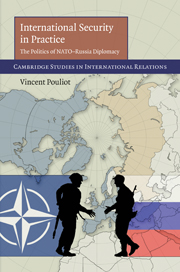Book contents
- Frontmatter
- Contents
- List of Figures and tables
- Preface
- Abbreviations
- 1 Introduction
- Part I Restoring the practical logic of peace
- Part II The symbolic power politics of NATO–Russia diplomacy
- 4 The logic of practicality at the NATO–Russia Council
- 5 The early steps: NATO, Russia and the double enlargement, 1992–1997
- 6 The fallout: NATO and Russia from Kosovo to Georgia, 1998–2008
- 7 Conclusion
- Bibliography
- Index
- Cambridge Studies in International Relations
4 - The logic of practicality at the NATO–Russia Council
Published online by Cambridge University Press: 03 May 2010
- Frontmatter
- Contents
- List of Figures and tables
- Preface
- Abbreviations
- 1 Introduction
- Part I Restoring the practical logic of peace
- Part II The symbolic power politics of NATO–Russia diplomacy
- 4 The logic of practicality at the NATO–Russia Council
- 5 The early steps: NATO, Russia and the double enlargement, 1992–1997
- 6 The fallout: NATO and Russia from Kosovo to Georgia, 1998–2008
- 7 Conclusion
- Bibliography
- Index
- Cambridge Studies in International Relations
Summary
Approaching Russian–Atlantic security relations from the practitioners' point of view, this chapter reconstructs insider knowledge at the NRC and its surroundings in 2006. By grasping the practical logics as they play themselves out during Russian–Atlantic security interactions on the ground, I seek to counter the representational bias (see Chapter 2). In terms of the sobjectivist methodology outlined in Chapter 3, I mainly perform the first step, which consists of the recovery of subjective meanings that comprise the logic of practicality. I proceed as atheoretically as possible and refrain from superimposing an analytical framework onto interview data. The theoretical narrative based on field analysis and the concept of hysteresis will become much more prominent in Chapters 5 and 6; for the moment I want to let practitioners speak for themselves with as little interference as possible.
In order to do this, I use two main methods. First, the chapter builds on sixty-nine qualitative interviews with security practitioners and experts in Ottawa, Brussels, Moscow, Washington, London and Berlin. These very rich data, comprised of hundreds of transcript pages and ethnographic notes, are complemented with a second method that can conveniently be called practice analysis. In the spirit of participant observation, I use a micro-focus on what Russian and NATO security officials do together at the NRC, in order to distil background knowledge from joint actions and respective practices. Where warranted, I also consider official declarations as discursive practices and add them to the data gathered in the field and through practice analysis.
Information
- Type
- Chapter
- Information
- International Security in PracticeThe Politics of NATO-Russia Diplomacy, pp. 95 - 147Publisher: Cambridge University PressPrint publication year: 2010
Accessibility standard: Unknown
Why this information is here
This section outlines the accessibility features of this content - including support for screen readers, full keyboard navigation and high-contrast display options. This may not be relevant for you.Accessibility Information
- 1
- Cited by
